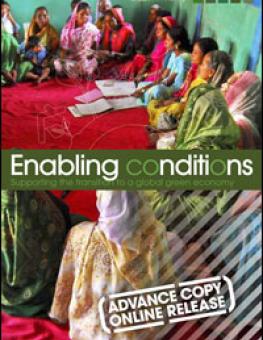
Towards a Green Economy: Pathways to Sustainable Development and Poverty Eradication - Enabling Conditions Supporting the Transition to a Global Green Economy
United Nations Environment Programme's Green Economy Initiative, in collaboration with economists and experts worldwide, compiled the book: "Towards a Green Economy: Pathways to Sustainable Development and Poverty Eradication."
The chapter: "Enabling Conditions Supporting the Transition to a Global Green Economy" was written by IISD staff and Environics Consulting Firm. The chapter focuses on the changes that could feasibly be introduced in the short to medium term by governments at all levels to enable the conditions that make green sectors attractive opportunities for investors and businesses. It discusses the five key areas of policy-making that have been highlighted in the previous chapters of the book as creating the enabling conditions that support a green economy transition:
how public investment and spending can be used to leverage private investment, including public infrastructure projects, green subsidies and sustainable public procurement;
how market-based instruments, such as taxes and tradable permits, can level the playing field and provide market incentives to promote the greening of key sectors;
how subsidy reform should be implemented in areas that deplete natural capital;
how a country's regulatory framework of legislation, institutions and enforcement can be designed to channel economic energy into environmentally and socially valuable activity; and
how international frameworks that regulate economic activity can play a role in driving a green economy.
The chapter concludes with a discussion of additional supporting measures that may be required—capacity building and investment in training and education.
To view the complete report, click here.
You might also be interested in
Toward a Coherent, Transformative Approach to Financing Sustainable Development, Climate, and Nature
Four key proposals for the Fourth Financing for Development Conference (FfD4) to create an integrated, equitable approach to financing climate, nature, and development goals.
FfD4: How the Fourth Financing for Development Conference can strengthen finance for development, climate, and nature
As FfD4 approaches, Alexandra Readhead explores key issues and how the conference can reshape global financing for SDGs, climate, and biodiversity.
What Will Happen at COP 29?
Talks at the 2024 UN Climate Change Conference (COP 29) will range from defining a way forward on finance through a new collective quantified goal (NCQG) to mitigation, and loss and damage. Ahead of negotiations in Baku, IISD’s Earth Negotiations Bulletin Team Lead Jennifer Bansard examines the agenda and breaks down what to watch as eyes turn to Azerbaijan.
Addressing Liquidity Challenges: A conceptual framework
A conceptual framework for addressing liquidity challenges in sovereign debt.